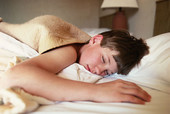- Could Your Grocery Store Meat Be Causing Recurring UTIs?
- Are You Making This Expensive Thermostat Error This Winter?
- Recognizing the Signs of Hypothyroidism
- 10 Strategies to Overcome Insomnia
- Could Artificial Sweeteners Be Aging the Brain Faster?
- Techniques for Soothing Your Nervous System
- Does the Water in Your House Smell Funny? Here’s Why
- Can a Daily Dose of Apple Cider Vinegar Actually Aid Weight Loss?
- 6 Health Beverages That Can Actually Spike Your Blood Sugar
- Treatment Options for Social Anxiety Disorder
Good Sleep Habits, Enforced Rules Help Kids Sleep: Study


A regular bedtime and other sleep-related rules help children and teens get a good night’s sleep, a new study suggests.
“Good quality and sufficient sleep are vital for children,” study leader Orfeu Buxton, an associate professor of biobehavioral health at Penn State in College Park, Pa., said in a university news release.
“Just like a healthy diet and exercise, sleep is critical for children to stay healthy, grow, learn, do well in school, and function at their best,” Buxton added.
Researchers analyzed survey responses from more than 1,100 American parents or guardians of youngsters aged 6 to 17.
Even though most of the parents believed sleep was important, only 10 percent of the children and teens in the study got the recommended amount of sleep for their age group. For ages 6 to 11, the amount of recommended sleep is at least nine hours a night. It’s at least eight hours nightly for ages 12 to 17, according to the study.
Youngsters were more likely to get better and more sleep if they had a regular bedtime and rules such as limited caffeine consumption and no electronic devices on in the bedroom after bedtime, the researchers found.
“An important consequence of our modern-day, 24/7 society is that it is difficult for families — children and caregivers both — to get adequate sleep,” Buxton noted.
The findings were published in the Jan. 26 issue of the journal Sleep Health.
More information
The U.S. Centers for Disease Control and Prevention has more about sleep.
Source: HealthDay
Copyright © 2026 HealthDay. All rights reserved.










